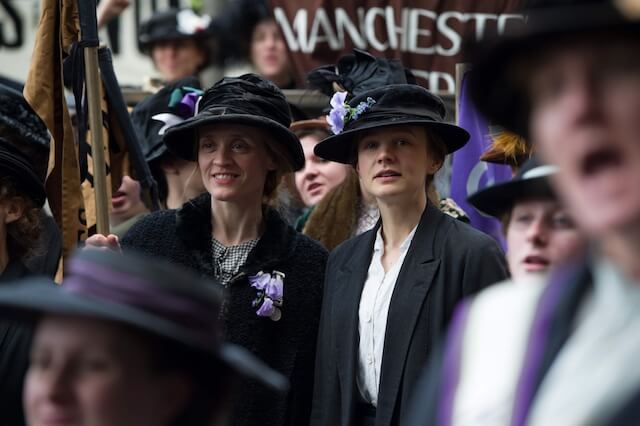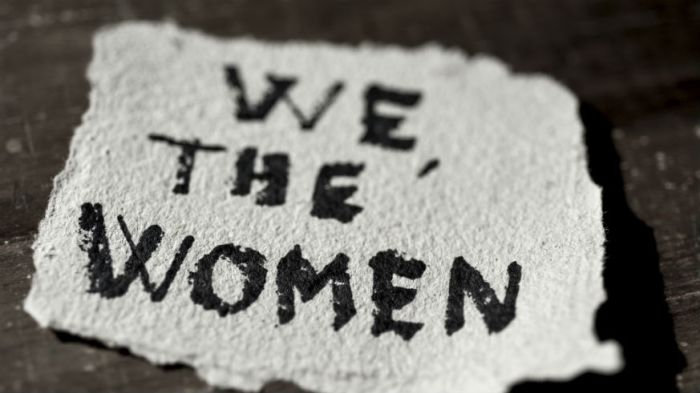‘Suffragette’ “Sufrragette” is too basic, too muddled as storytelling and even too cowardly in who it chooses for protagonist. But it’s also tough. Once hero Maud Watts (Carey Mulligan) has gone from anonymous Cockney laundrette washer in 1912 London to militant activist against laws that discriminate against women, she’s full-on. The film, with occasional, slight exceptions, is too. It doesn’t sugarcoat things, and it even opens with a title card about how previous attempts at Suffragette-like movements had failed because they were peaceful and didn’t do things like break windows, blow up mailboxes and get in nasty skirmishes with club-happy police. Maud does all of those and more, and though she’s punished by losing custody of her young child, the movie makes it clear that’s more the fault of her weak-willed, hissable-pathetic husband (Ben Whishaw), not of her adopting a noble cause. That Maud had to be swept into this world at all points to a common annoyance in movies about activism. You can’t just start with someone fighting for human rights, especially when the fighting involves destruction and even violence. Movies, especially those aiming for mainstream acceptance, too often take the tip-toe method, introducing innocent tabula rasas like Maud to ease us into a world that might make some uncomfortable. Naturally Maud is a complete invention, hob-nobbing about with real people like Meryl Streep’s Dr. Mabuse-like Suffragette leader Emmeline Pankhurst — seen but once, bellowing to a crowd from a balcony, like Eva Peron about to sing “Don’t Cry for Me, Argentina.” RELATED: “The Keeping Room” is a feminist Western that delivers the goods Following some invented blank character’s awakening is what “Stonewall” did. That’s not what “Selma” did. Granted, “Selma” had a hero with a national holiday in his honor. But that also meant it skipped the hand-holding and got right down to business. And it meant that a movement wasn’t Otherized. The Suffragettes are introduced as howling nuisances, destroying private businesses and rudely interrupting city life. Maud has to take baby steps into their fold, but by the time she’s shouting amidst a crowd of fellow screwed-over activists, there’s no turning back, and “Suffragette” stops apologizing for its existence. Director Sarah Gavron keeps things rough and grimy and heavy, filling scenes with the loud thrum of gears turning in factories and emphasizing the sounds of women being clubbed by angry men or being knocked onto cobblestones. She’s right there with them. Still, there’s a lot to cover in “Suffragette,” even though it only spans just over a year, and even though it ends far from when women achieved even a smidgeon of the rights its characters fight for. (There’s an extensive end title crawl, of course, although at least it doesn’t list a website you can go to.) The script, by Abi Morgan (“Shame,” “The Iron Lady” and Gavron’s own “Brick Lane”), stuffs a lot in to under two hours, but it often feels like its just checking off boxes rather than building it organically. It semi-randomly ends with the galvanizing martyr-suicide of Emily Davison — up till then a minor character played by “My Summer of Love”’s Natalie Press. Following her instead of a made-up fiction like Maud not only would have given the film some much-needed shape, and not only would have actually supplied a more easily emotional end. It would have also meant a film about a topic that, “men’s rights activists” side, anyone can get behind got its just due. Instead it pretends like we need convincing first.
Director: Sarah Gavron
Stars: Carey Mulligan, Anne-Marie Duff
Rating: PG-13
3 (out of 5) Globes
‘Suffragette’ shows the problem of tabula rasa leads in activist movies

Steffan Hill, Focus Features
Follow Matt Prigge on Twitter @mattprigge
























